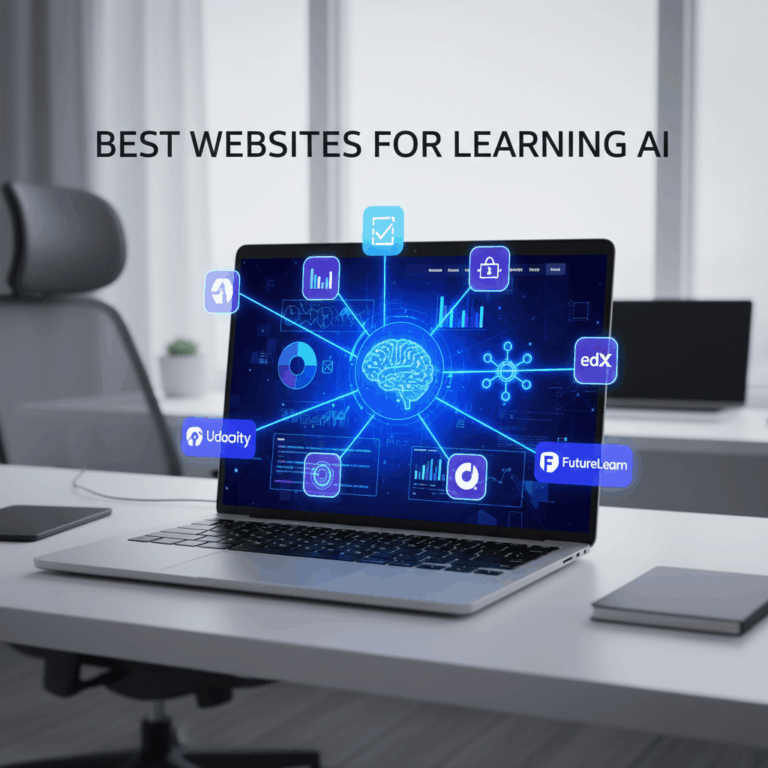Overview of AI Learning Platforms
AI learning platforms in 2025 offer personalized, scalable, and efficient education solutions for individuals and organizations. These platforms integrate AI to enhance learning experiences and outcomes.
Using AI-driven features like adaptive learning paths, automated assessments, and real-time analytics, these platforms make AI education more accessible, engaging, and tailored to each user’s needs.
From university-level systems to corporate training tools, the variety of AI learning platforms supports diverse goals and skill levels across multiple industries and learner types.
Key Features of Leading Platforms
Leading AI platforms provide personalized learning paths that adapt to individual pace and goals, improving knowledge retention and engagement. Automation speeds up assessments.
They also offer smart content management, such as AI-based content tagging, transcription, and natural language search, making it easy to find and create courses.
Real-time analytics and feedback help learners and administrators monitor progress, while multilingual support and scalability ensure suitability for diverse and large user bases.
Notable Innovations
Some platforms include AI tools like intelligent agents to automate reminders and interventions, enhancing learner motivation and success rates automatically.
Target Audiences and Use Cases
These platforms serve a wide range of learners, including university students, corporate employees, and professional trainers who need flexible and effective AI education solutions.
Organizations use AI learning platforms to upskill and reskill workforces, while individual learners benefit from self-paced paths and certifications to advance careers.
Enterprise platforms cater to compliance-heavy industries and large organizations requiring deep integrations and customized reporting to meet specialized training needs.
Top AI-Powered Learning Management Systems
The top AI-powered learning management systems (LMS) in 2025 provide powerful tools for personalized education and streamlined administration. These platforms are designed to meet the evolving needs of institutions and businesses.
By leveraging AI capabilities like adaptive learning, content automation, and predictive analytics, these LMS solutions help improve learner engagement and organizational training impact efficiently.
GOLS LMS Capabilities and Benefits
GOLS LMS stands out as a comprehensive AI learning platform tailored for universities and enterprises. It offers personalized learning paths that adjust to individual goals and learning speeds.
The system supports smart automated assessments with instant feedback, secure online exams, and real-time performance analytics to track learner progress effectively.
Its scalability and multilingual support make GOLS LMS suitable for large organizations seeking a robust, adaptable AI education platform that enhances learning outcomes globally.
360Learning’s AI Authoring and Content Features
360Learning uniquely blends LMS and Learning Experience Platform (LXP) functionalities to support workforce upskilling through AI-powered course creation tools that accelerate content development.
The platform offers automatic content transcription, quiz suggestions, and a natural language search feature, streamlining content accessibility and improving learning engagement.
Moreover, 360Learning provides a free certification program, empowering learning and development professionals with advanced skills in AI-driven training methodologies.
Docebo’s Personalized Learning Experience
Docebo leverages AI to deliver a highly personalized learning experience by automatically tagging and recommending content based on user behavior and preferences.
Its Deep Search feature ensures learners can quickly find relevant materials, enhancing efficiency and knowledge retention in scalable enterprise environments.
This focus on tailored content delivery makes Docebo ideal for organizations aiming to boost employee development with customized educational pathways.
Absorb LMS and D2L Brightspace for Enterprises
Absorb LMS utilizes AI to simplify administrative workflows and provides personalized learning paths that align with employees’ job competencies and development needs.
D2L Brightspace caters to enterprises with complex demands, featuring AI tools such as the Lumi course builder and intelligent agents to automate reminders and learner interventions.
Both platforms emphasize predictive analytics, compliance support, and deep system integrations, making them excellent choices for organizations requiring advanced, enterprise-grade AI learning solutions.
Additional Resources for AI Education
Beyond dedicated AI learning platforms, numerous additional resources help learners deepen their AI knowledge. These include MOOCs, AI-focused blogs, research hubs, and course creation tools leveraging AI.
Such resources provide flexible options for students and professionals who want to stay updated or create AI learning experiences efficiently, complementing comprehensive LMS platforms.
MOOC Platforms Providing AI Courses
MOOC platforms like Coursera and edX offer a broad range of AI courses from top universities and companies worldwide, supporting beginner to advanced learners.
These platforms provide certifications, flexible scheduling, and interactive content, making them popular for individuals seeking affordable, high-quality AI education remotely.
With AI-related specializations, learners can acquire skills in machine learning, data science, and AI ethics, often combining theory with practical projects to enhance job readiness.
AI Blogs and Research Platforms
AI blogs and research platforms deliver continuous insights about the latest trends, breakthroughs, and best practices in artificial intelligence, essential for staying current in this fast-evolving field.
Resources such as arXiv, Medium AI publications, and specialized AI news websites provide expert analyses, tutorials, and discussion forums that benefit learners and practitioners alike.
Following these sources helps develop critical thinking and awareness of emerging AI applications, ethics, and policy implications impacting global technology landscapes.
AI-Powered Course Creation Tools
AI-powered course creation tools assist educators and trainers by automating content summarization, note generation, and quiz creation, accelerating course development processes significantly.
These tools use natural language processing and machine learning to improve content relevance and accessibility, enabling more engaging and personalized learning experiences.
By supporting efficient course creation, they empower institutions and independent instructors to scale AI education with consistent quality and innovative instructional designs.
Choosing the Right Platform for AI Learning
Selecting the ideal AI learning platform depends on your unique goals, background, and preferred learning style. Understanding platform features and flexibility helps ensure success.
Whether you are an individual learner or an organization, careful evaluation of content quality, AI tools, and scalability is critical for achieving effective AI education outcomes.
Factors to Consider for Individual Learners
Individual learners should prioritize platforms offering personalized learning paths that adapt to their pace and knowledge level to maximize retention and engagement.
Accessibility features, course variety, and certification options enhance motivation, while AI-driven content discovery simplifies navigation and deepens understanding.
Cost, platform usability, and the availability of community or instructor support are also vital factors in selecting a platform that fits your learning preferences.
Selection Criteria for Organizations and Enterprises
Organizations must consider platforms with strong scalability and integration capabilities to support diverse learner groups and complex administrative requirements.
AI features like automated assessments, predictive analytics, and personalized content delivery play key roles in optimizing workforce upskilling and training efficiency.
Compliance support, multilingual options, and robust reporting tools are essential for enterprises needing to satisfy industry regulations and monitor training outcomes effectively.







